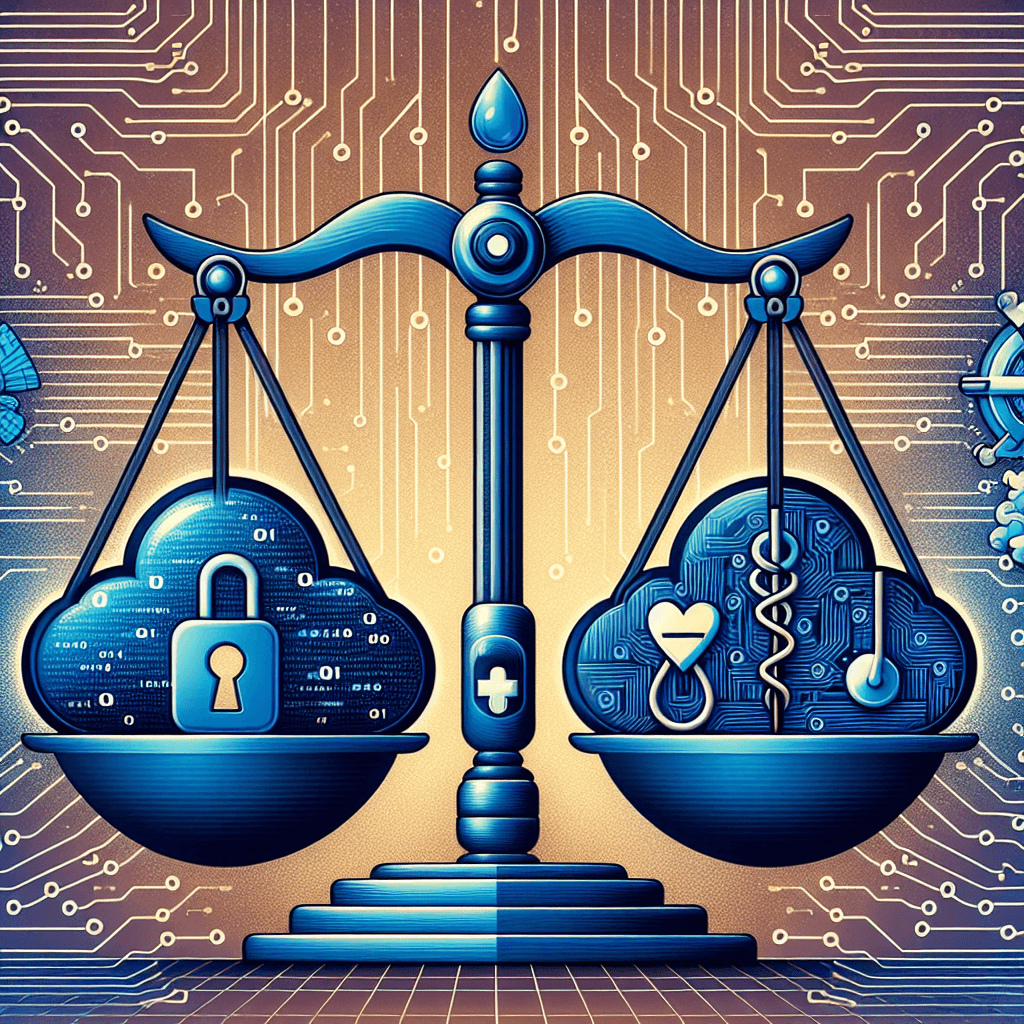In today’s increasingly digital world, the millions of individuals utilizing digital health platforms are constantly faced with the challenge of striking a delicate balance between safeguarding their personal information and reaping the numerous benefits that these platforms provide. As the demand for personalized health data continues to grow, concerns regarding privacy and data security have become paramount. This article explores the intricate relationship between personal data privacy and the advantages offered by digital health services, shedding light on the importance of finding a harmonious equilibrium that preserves privacy while maximizing health benefits.
Table of Contents
The Importance of Personal Data Privacy
Understanding the value of personal data
Personal data refers to any information that can be used to identify an individual, such as name, birthdate, address, social security number, and medical records. In today’s digital age, where technology plays a significant role in our lives, individuals generate vast amounts of personal data through their online activities, devices, and interactions with various platforms and services.
Understanding the value of personal data is crucial in recognizing the importance of privacy. This information is highly valuable to organizations, including healthcare providers, insurance companies, marketers, and cybercriminals. It can be used for various purposes, such as targeted advertising, research and development, personalized healthcare services, and even identity theft.
The potential risks of data breaches
Data breaches have become a major concern in recent years, with numerous high-profile cases drawing attention to the vulnerabilities of personal data. These breaches occur when unauthorized individuals gain access to sensitive information, leading to potential misuse, identity theft, financial fraud, and reputational damage.
The consequences of data breaches can be severe, impacting individuals’ privacy, financial security, and even their physical well-being. For example, if personal health information, including medical histories and test results, falls into the wrong hands, it can lead to blackmail or discrimination, jeopardize employment opportunities, or hinder access to insurance coverage.
Exploring the importance of consent in data collection
Consent is a fundamental aspect of data privacy. It refers to the individual’s voluntary agreement to allow their personal information to be collected, processed, and used for specific purposes. In the context of digital health, consent plays a crucial role in ensuring that individuals have control over their data and how it is used.
Obtaining informed consent means providing individuals with clear and understandable information about what data is being collected, why it is being collected, and how it will be used. It also involves giving individuals the ability to make informed decisions about their data, including the choice to opt-out or withdraw consent at any time.
Consent is essential in establishing a trust-based relationship between individuals and organizations. It empowers individuals to have a say in the use of their data, promotes transparency, and fosters accountability in data handling practices.
Understanding Digital Health Benefits
Exploring the impact of digital health on healthcare delivery
Digital health encompasses various technologies and solutions that leverage digital platforms, data analytics, and connectivity to enhance healthcare delivery. From electronic health records to telemedicine and mobile health applications, digital health has the potential to revolutionize healthcare by improving efficiency, accessibility, and patient outcomes.
Digitizing healthcare records and embracing electronic health records (EHRs) enable healthcare providers to streamline patient data management, reduce errors, and facilitate better coordination and communication between different healthcare professionals. This results in improved care quality, reduced costs, and enhanced patient safety.
Improved access to healthcare information
digital health solutions enable individuals to access, manage, and share their healthcare information more easily. Through patient portals, individuals can view their medical records, test results, and treatment plans, empowering them to actively participate in their own care. This access to information helps individuals make informed decisions about their health, promotes self-management, and facilitates proactive communication with healthcare providers.
Moreover, digital health solutions, such as wearable devices and health tracking apps, provide individuals with real-time data on their health metrics, such as heart rate, blood pressure, and sleep patterns. This data can be valuable for tracking progress, identifying early warning signs, and promoting preventive healthcare practices.
Enhanced patient engagement and empowerment
Digital health technologies facilitate greater patient engagement by enabling individuals to take an active role in managing their health and well-being. Patient engagement involves actively participating in healthcare decisions, setting goals, and adhering to treatment plans.
Through mobile health applications, individuals can receive personalized health recommendations, reminders for medication adherence, and educational content tailored to their specific conditions. These tools promote self-care, empower individuals to monitor their health, and encourage behavior change for better health outcomes.
Additionally, digital health solutions enable patients to communicate with healthcare providers remotely, reducing the need for in-person visits. This not only improves convenience but also enhances access to care, particularly for individuals in remote or underserved areas.

Emerging Technologies in Digital Health
Artificial Intelligence and Machine Learning
Artificial intelligence (AI) and machine learning (ML) have transformative potential in digital health. These technologies involve the use of algorithms to analyze vast amounts of data, identify patterns, and generate insights that can improve diagnosis, treatment, and personalized healthcare recommendations.
In healthcare, AI and ML can be used for tasks such as medical image analysis, disease diagnosis, predicting treatment outcomes, and identifying potential adverse events. By learning from historical data and continuously refining their algorithms, these technologies can enhance accuracy, reduce errors, and enable earlier detection of diseases or interventions.
Internet of Things (IoT)
The Internet of Things (IoT) refers to a network of interconnected devices, sensors, and systems that collect and exchange data. In the context of digital health, IoT can revolutionize the way healthcare is delivered and monitored.
Through IoT devices, such as wearables, smart home monitoring systems, and implantable sensors, individuals can continuously collect data on their health status, environmental factors, and lifestyle habits. This real-time data can provide healthcare providers with valuable insights for early detection of health issues, remote monitoring of chronic conditions, and preventive interventions.
Moreover, IoT can enable seamless integration and interoperability of healthcare devices and systems, enhancing care coordination, reducing duplication of efforts, and improving patient outcomes.
Blockchain technology
Blockchain technology has gained significant attention for its potential in improving data security, transparency, and trust in digital transactions. In healthcare, blockchain can play a crucial role in protecting personal health information, securing medical records, and ensuring the integrity of data.
Through its decentralized and immutable nature, blockchain can create a tamper-proof, auditable record of healthcare transactions, treatment plans, and consent agreements. This can enhance data privacy, enable secure data sharing between healthcare providers, and facilitate interoperability between different health systems.
Furthermore, blockchain can empower individuals to have ownership and control over their health data. By providing individuals with private keys and allowing them to grant access to their data, blockchain can shift the power dynamics and put individuals at the center of their healthcare journey.
Challenges in Balancing Privacy and Health Benefits
Data security and breach concerns
Despite the numerous benefits of digital health, the collection and storage of personal data also present significant challenges in terms of data security and the risk of breaches. The increasing digitization of healthcare records, coupled with the growing sophistication of cyberattacks, has heightened concerns about the safety of personal health information.
Healthcare organizations face the daunting task of implementing robust security measures to protect the privacy and confidentiality of individuals’ data. This includes employing encryption technologies, access controls, and regular vulnerability assessments. However, the evolving nature of cyber threats requires constant vigilance and adaptation to ensure data security.
Lack of clear regulatory frameworks
Digital health technologies often operate in a complex regulatory landscape, with different jurisdictions and sectors having varying rules and regulations. This lack of clear and consistent regulatory frameworks can pose challenges for ensuring data privacy and protection.
The absence of clear guidelines can lead to ambiguity about data handling practices, consent requirements, and data breach notification procedures. This can create a lack of accountability and transparency, making it difficult for individuals to understand their rights and for organizations to navigate the complexities of regulatory compliance.
Ethical considerations
Balancing privacy and health benefits also involves addressing ethical considerations surrounding the use of personal data. The widespread collection and analysis of individuals’ health information raise concerns about potential discrimination, stigmatization, and breaches of autonomy.
For example, AI algorithms used in healthcare decision-making may inadvertently perpetuate biases, leading to unequal access to healthcare services or inaccurate treatment recommendations. As digital health evolves, it is crucial to address ethical considerations and ensure that the benefits of technology are equitably distributed and aligned with individual rights and values.

Establishing Trust in Digital Health Systems
Transparency in data collection and usage
Transparency plays a pivotal role in establishing trust between individuals and digital health systems. It involves being upfront and open about data collection practices, how data will be used, and who will have access to it. This transparency empowers individuals to make informed decisions about their data and fosters trust by promoting accountability and ethical behavior.
Healthcare organizations should provide clear and concise privacy policies, consent forms, and terms of service to ensure individuals have a complete understanding of how their data will be handled. Transparency also involves regularly updating individuals about any changes in data handling practices or policies and allowing individuals to exercise their rights to access, rectify, or delete their data.
Providing individuals with control over their data
Empowering individuals to have control over their data is an essential element of building trust in digital health systems. This control can be achieved through mechanisms such as granular consent management, allowing individuals to specify which data can be shared and with whom.
digital health platforms should provide individuals with user-friendly tools to manage their data preferences, including options to revoke consent, limit data collection, and choose the duration for which their data can be stored. Providing individuals with control over their data enhances their sense of ownership, autonomy, and privacy, ultimately building trust and confidence in digital health systems.
Educating users about privacy risks
Education is key to raising awareness about privacy risks and empowering individuals to make informed decisions about their personal data. Healthcare organizations, technology companies, and policymakers should focus on educating users about the potential risks of data breaches, the importance of consent, and the rights individuals have over their data.
User-friendly privacy guides, online resources, and educational campaigns can help individuals understand the implications of data sharing, the security measures in place to protect their information, and the steps they can take to enhance their privacy. Education also involves promoting digital literacy and equipping individuals with the knowledge and skills to navigate the digital health landscape safely.
Legal and Regulatory Frameworks for Data Privacy
General Data Protection Regulation (GDPR)
The General Data Protection Regulation (GDPR) is a comprehensive data protection framework enacted by the European Union (EU) to safeguard the privacy and rights of individuals. It applies to any organization that processes the personal data of individuals within the EU, regardless of where the organization is located.
The GDPR sets rigorous standards for data protection, including requirements for obtaining valid consent, implementing appropriate security measures, and allowing individuals to exercise their rights over their data. It also establishes severe penalties for non-compliance, emphasizing the importance of privacy and accountability.
Health Insurance Portability and Accountability Act (HIPAA)
In the United States, the Health Insurance Portability and Accountability Act (HIPAA) provides a federal framework for protecting the privacy and security of individuals’ health information. HIPAA applies to covered entities, such as healthcare providers, health plans, and healthcare clearinghouses, as well as their business associates.
HIPAA mandates the implementation of safeguards to protect the privacy and security of individually identifiable health information, including requirements for physical, technical, and administrative security measures. It also grants individuals certain rights to access, amend, and receive an accounting of their protected health information.
Other global privacy laws
Alongside the GDPR and HIPAA, many countries have enacted privacy laws and regulations specific to the healthcare sector, aiming to protect individuals’ personal health information. For example, Canada has the Personal Information Protection and Electronic Documents Act (PIPEDA), and Australia has the Privacy Act 1988.
These laws establish principles and standards for data protection, providing individuals with rights and organizations with obligations in handling personal health information. While there may be differences in specific requirements and enforcement mechanisms, the underlying goal of safeguarding individuals’ privacy remains consistent.

Informed Consent and Data Sharing
The importance of obtaining informed consent
Obtaining informed consent is a cornerstone of ethical data collection and data sharing practices in digital health. Informed consent requires individuals to be sufficiently informed about the nature, purpose, and consequences of the data collection or sharing activity before giving their consent.
Informed consent involves providing individuals with clear and understandable information about what data will be collected or shared, who will have access to it, and how it will be used. It also requires giving individuals the opportunity to ask questions, seek clarification, and make an informed decision based on their understanding of the risks and benefits involved.
Ensuring appropriate data sharing practices
Data sharing plays a vital role in digital health, enabling collaboration, research, and the development of innovative healthcare solutions. However, data sharing must be conducted responsibly, with appropriate safeguards in place to protect individuals’ privacy and confidentiality.
Healthcare organizations and researchers should follow best practices in data anonymization and de-identification to minimize the risks of re-identification. This involves removing or encrypting identifying information, aggregating data to prevent individual identification, and implementing secure data sharing protocols.
Additionally, data sharing agreements and contracts should clearly define the purposes, limitations, and conditions under which data will be shared. This ensures that data is only used for authorized purposes and that individuals’ privacy rights are respected throughout the data sharing process.
Addressing data anonymization and de-identification
Anonymization and de-identification are crucial techniques used to protect individuals’ privacy when sharing data in digital health. Anonymization involves removing or modifying identifying information from datasets to ensure that individuals cannot be re-identified. De-identification involves transforming data in a way that limits or eliminates the possibility of linking the data back to an individual.
These techniques help protect individuals’ privacy while still allowing data to be used for research, public health initiatives, and the development of healthcare innovations. However, it is essential to recognize that complete anonymization may be challenging to achieve, as advances in technology and data analytics techniques have made re-identification more feasible.
Organizations must continually reassess their anonymization and de-identification practices to mitigate the risk of re-identification and stay abreast of evolving privacy concerns.
Privacy-Preserving Technologies
Privacy-enhancing cryptography
Privacy-enhancing cryptography is a set of cryptographic techniques designed to protect the privacy and security of individuals’ data. These techniques enable secure data exchange, data sharing, and data analytics while preserving privacy.
Techniques such as homomorphic encryption, secure multiparty computation (MPC), and zero-knowledge proofs allow computations to be performed on encrypted data without revealing the underlying information. This ensures that individuals’ data remains private and confidential throughout the data processing cycle.
By leveraging privacy-enhancing cryptography, healthcare organizations and other stakeholders can benefit from the insights generated by data analysis while maintaining the privacy and confidentiality of personal health information.
Differential privacy techniques
Differential privacy is a privacy-preserving technique that aims to prevent the disclosure of sensitive information about individuals in statistical analyses. It involves adding noise or perturbation to the data to achieve a balance between data utility and privacy protection.
Differential privacy techniques enable the analysis of aggregate data without revealing individual-level information, protecting individuals’ privacy while still allowing meaningful insights to be derived. These techniques are particularly valuable in healthcare research, where data sharing and analysis are paramount for advancing medical knowledge.
By adopting differential privacy techniques, organizations can strike a balance between the benefits of data analysis and the protection of individuals’ privacy.
Secure multi-party computation
Secure multi-party computation (MPC) is a cryptographic technique that enables multiple parties to jointly compute a function on their private inputs without revealing those inputs to each other. This technique ensures privacy and confidentiality while enabling collaborative computation and analysis.
In the context of digital health, secure multi-party computation can allow healthcare organizations and researchers to pool their data resources, perform analyses, and generate insights without disclosing sensitive individual data. This encourages collaboration and knowledge sharing while protecting privacy.
By leveraging secure multi-party computation, stakeholders can collectively benefit from the pooled knowledge and insights generated by combining data without compromising privacy and confidentiality.

Collaboration between Stakeholders
Healthcare providers and technology companies
Collaboration between healthcare providers and technology companies is crucial for realizing the full potential of digital health while addressing privacy concerns. Healthcare providers possess extensive clinical knowledge, patient data, and on-the-ground experience, while technology companies bring expertise in software development, data analytics, and innovative technologies.
By working together, healthcare providers and technology companies can develop and deploy privacy-centric digital health solutions that meet the needs of both patients and healthcare professionals. Collaboration can enable the co-design of user-friendly platforms, integrate privacy-enhancing technologies, and ensure that ethical and privacy considerations are embedded throughout the development process.
Government involvement and regulation
Government involvement and regulation play a vital role in balancing personal data privacy and digital health benefits. Governments have the responsibility to create and enforce privacy laws, establish regulatory frameworks, and develop guidelines for data protection in healthcare.
Government agencies can work collaboratively with healthcare organizations, technology companies, and privacy advocates to establish industry standards, promote best practices, and address emerging challenges in the digital health landscape. By actively engaging in policy dialogue and regulation, governments can ensure that personal data privacy is upheld while maximizing the benefits of digital health for individuals and society as a whole.
Data protection agencies
Data protection agencies have a crucial role in safeguarding individual rights and enforcing privacy laws. These agencies are responsible for monitoring compliance with privacy regulations, investigating data breaches, and taking appropriate actions to address non-compliance.
Data protection agencies can work collaboratively with healthcare organizations and technology companies to promote privacy best practices, provide guidance on compliance, and support individuals in exercising their privacy rights. By actively engaging with data protection agencies, stakeholders can ensure ongoing accountability, transparency, and continuous improvement in data privacy practices.
The Future of Personal Data Privacy and Digital Health
Balancing innovation and privacy concerns
As digital health continues to evolve, balancing innovation with privacy concerns will remain a critical challenge. The rapid advancement of technologies such as AI, IoT, and blockchain offers immense potential to transform healthcare delivery and improve outcomes. However, it is essential to strike a balance that harnesses the benefits of technology while protecting individuals’ privacy and autonomy.
Innovation must be accompanied by responsible data handling practices, privacy-by-design principles, and ongoing risk assessments. By proactively addressing privacy concerns, stakeholders can build trust and confidence in digital health systems, ensuring that individuals can reap the benefits of new technologies without compromising their privacy.
Developing ethical frameworks for emerging technologies
Emerging technologies in digital health, such as AI, IoT, and blockchain, necessitate the development and implementation of ethical frameworks. These frameworks should guide the ethical use of technology, promote fairness, transparency, and accountability, and protect individuals’ privacy and rights.
Ethical frameworks should address issues such as algorithmic bias, informed consent, data anonymization, and the responsible use of AI in healthcare decision-making. By integrating ethical considerations into the design and deployment of emerging technologies, stakeholders can ensure that innovation aligns with societal values, human rights, and individuals’ well-being.
Enhancing public awareness and education
Public awareness and education are crucial in shaping the future of personal data privacy and digital health. Individuals need to be informed about the risks and benefits of sharing their personal health information, as well as their rights and options for protecting their privacy.
Healthcare organizations, technology companies, and policymakers should invest in public awareness campaigns, educational programs, and user-friendly resources to empower individuals to make informed decisions about their data. Enhanced digital literacy and privacy education will strengthen individuals’ ability to navigate the digital health landscape and actively participate in shaping privacy norms and policies.
By prioritizing public awareness and education, stakeholders can foster a privacy-conscious society that demands privacy-preserving technologies, holds organizations accountable, and actively safeguards personal data privacy.
In conclusion, personal data privacy is of paramount importance in the digital health era. Understanding the value of personal data, recognizing the potential risks of data breaches, and ensuring informed consent are essential steps in protecting individuals’ privacy. Digital health offers numerous benefits, including improved access to healthcare information and enhanced patient engagement. However, balancing privacy and health benefits presents challenges, including data security concerns, lack of clear regulatory frameworks, and ethical considerations. Establishing trust in digital health systems requires transparency, giving individuals control over their data, and educating users about privacy risks. Legal and regulatory frameworks, such as the GDPR and HIPAA, provide guidelines for data privacy. Informed consent and appropriate data sharing practices play a crucial role in protecting privacy. Privacy-preserving technologies like cryptography, differential privacy, and secure multi-party computation can enhance privacy without sacrificing the benefits of data analysis. Collaboration between stakeholders, including healthcare providers, technology companies, governments, and data protection agencies, is essential for addressing challenges and upholding privacy principles. The future of personal data privacy and digital health requires a delicate balance between innovation, ethics, and public awareness. By prioritizing privacy, developing ethical frameworks, and enhancing education, the potential of digital health can be realized while safeguarding individuals’ privacy.


